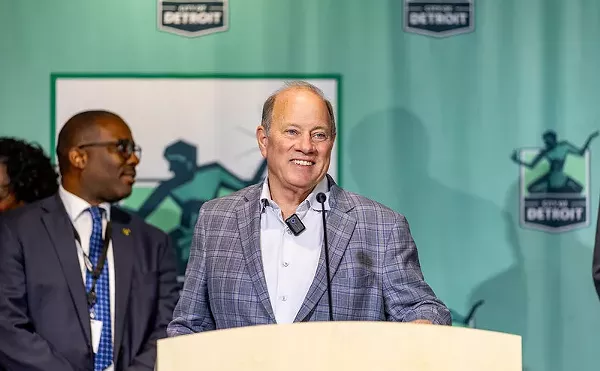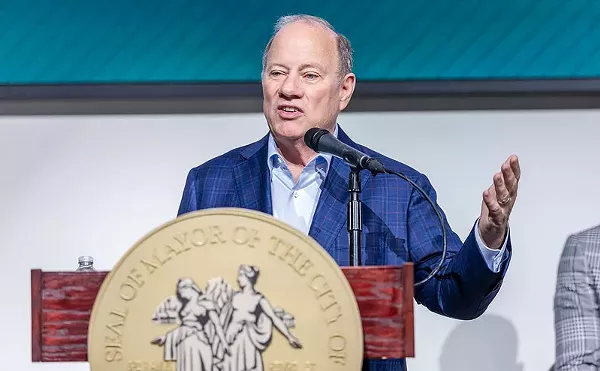
Audio By Carbonatix
[
{
"name": "GPT - Leaderboard - Inline - Content",
"component": "35519556",
"insertPoint": "5th",
"startingPoint": "3",
"requiredCountToDisplay": "3",
"maxInsertions": 100,
"adList": [
{
"adPreset": "LeaderboardInline"
}
]
}
]
The July 1 deadline for deciding the long-term future for disposal of Detroit's garbage has come and gone, but we here at the Hits, even with a fixation on the issue that borders on the unnatural, can't tell you with any certainty what that future will be.
And part of the reason we don't know what's going on is that decision-makers appear to be blowing a lot of smoke.
We do know this: For much of the past year, as opponents of the waste-to-energy incinerator battled to get the facility on the city's east side shut down, there's been a feeling that the powers that be would do whatever it takes to keep the burner going.
Sure, the City Council last year passed a pair of resolutions calling on the Greater Detroit Resource Recovery Authority (GDRRA) — the quasi-public agency responsible for overseeing disposal of the city's municipal waste — to stop sending trash to the incinerator, shifting instead to landfills while ramping up efforts to establish a curbside recycling program.
On top of that, the council, on a 6-2 vote, last week passed another resolution: This one authorizes hiring an attorney to provide guidance in seeking an injunction that would halt shipment of city garbage to the incinerator.
That had area greens cheering.
It's not that the coalition of environmental groups that has been pushing for the change is enamored with dumps; the methane emitted from landfills is about 20 times more potent in terms of greenhouse effect than carbon dioxide. But, along with health and cost concerns, the enviros see the incinerator as an impediment to what they really want: a world-class recycling program. They say that's what makes the most sense environmentally and economically. But with the incinerator needing 800,000 tons of trash a year to produce the steam and electricity it is contractually obligated to provide, there is an inherent disincentive to recycling, they claim.
The incinerator needs all the garbage it can get, especially high-BTU fuel such as paper and plastic — which is also among the easiest materials to recycle. At this point, only about 300,000 tons of city trash is being burned a year, according to John Prymack, GDRRA's director. The rest comes from private haulers who, until now, have had their fees subsidized by Detroit taxpayers. These private haulers, who bring in suburban trash as well as garbage from businesses within the city, pay about $15 a ton, says Prymack.
The city, which until now has been obligated to pay off bonds used to fund construction of the facility as well as the addition of costly air-pollution control equipment installed in the early 1990s, also had to guarantee the facility got those 800,000 tons of trash every year, or pay a penalty.
But now, with the bonds paid off, that obligation no longer exists, assures Prymack. Which means that those private haulers will supposedly have to start paying the market rate — which, we assume, would be close to the $25 per ton the city will reportedly be paying to burn its trash now that the bonds have been paid off.
Being an astute reader, you probably notice the above paragraph contains the weasely words "supposedly" and "assume." That's because we're not getting much clarification from the office of Mayor Dave Bing, who appoints the GDRRA board members.
That and there seems to be an emerging credibility problem here.
At the June 18 meeting where a decision about awarding a contract to either a landfill or the incinerator owner was supposed to be made but wasn't, Prymack stated on the record that no announcement was ever intended that day — even though a report from the council's Research and Analysis Division (RAD) quoted a letter from Prymack stating an announcement would be made at the meeting.
At that same meeting, Amanda Van Dusen, a Miller Canfield attorney who represents GDRRA, stated that Detroit Thermal, which buys the steam produced by the incinerator and then sells much of it to the city for heating and cooling buildings that are part of a network from downtown to the New Center area, would have trouble staying in business if that steam were no longer available.
That statement took us by surprise. As part of this rag's ongoing series of stories about the incinerator debate, we did a cover story last year looking specifically at Detroit Thermal and its relationship with the incinerator. At the time, Detroit Thermal President Victor Koppang said the company could switch over to burning natural gas and provide all the steam necessary.
What, we wondered, had changed in the interim? Turns out nothing has changed. We talked with Koppang this week and he told us that not only could his company supply steam without the incinerator, it was doing so as we spoke because the previous contract with facility operator Covanta expired as of July 1, and a new agreement had not been reached. As a result, the incinerator, while sill burning garbage and producing electricity (which is sold to DTE) is not currently generating any steam. (Covanta, for the record, is both the operator of the facility and also a co-owner, having recently purchased a 30 percent stake in the facility.)
"We made the transition without a hiccup," said Koppang. "Our customers weren't affected at all."
Neither is there much concern on his part about the company's ability to keep going without the incinerator. Prymack, at the June 18 meeting, suggested to us that the price for burning natural gas could be so costly Detroit Thermal couldn't remain viable. But Koppang said that given natural gas reserves available, and the nation's current usage, that really isn't a concern for the foreseeable future.
But that didn't stop Charlie Beckham, Bing's chief administrative officer and the newly appointed chair of the GDRRA board, from going on WDET's Detroit Today program and declaring one of the big reasons for continuing to use the incinerator is so that the city schools also on Detroit Thermal's loop wouldn't have to go without heat.
So there's why Detroit has to keep burning its trash: It's for the sake of the kids. Who would want to do anything that would lead to all those tykes sitting at their desks shivering with cold?
Not everyone is as cynical as News Hits when it comes to this issue. There is, for example, Dan McCarthy. As the business rep for the International Union of Operating Engineers Local 547, McCarthy represents more than 120 people employed by the plant. He is, we think, a good guy.
He informs us that a one-year operating agreement between Covanta and majority owner Energy Investors Funds has been inked, but that Covanta is telling employees they plan to be in Detroit for the long haul. That's a good thing, McCarthy says, not just for those employees, but the city as a whole.
"I'm dismayed that people think landfills would be a better option," he said. "That seems reckless to me."
Certainly there are pros and cons involved with either landfills or the incinerator, and figuring out the best option is incredibly complicated. But what we find dismaying is the extent to which the City Council and, by extension, the taxpaying public, is being kept in the dark about what's really going on.
Over and over in its reports to the council, RAD attorneys complain that they are not being given documents necessary to make a fair and fully informed analysis of the deals being worked out behind closed doors. In fact, in yet another resolution recently passed, the council practically begged GDRRA to let them know what the long-term plan is, what the costs will be, and what the benefits of that plan are for the city.
There's still no answer.
Why, if there's nothing to hide, is GDRRA making it so hard for the people paying the bill to know what exactly they are up to?
Something stinks. And it's not the garbage.





